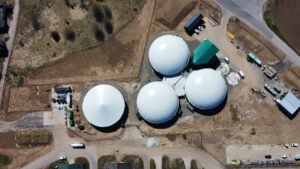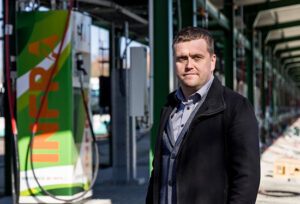
Happy Holidays!
We wish you a peaceful holiday season and a successful New Year.…

Biomethane is a biofuel from renewable sources, with more than 95% methane (CH₄), with properties equivalent to natural gas, and can be used in the same places of consumption as natural gas.
The start-up of the biomethane plant will allow a reduction in fossil fuel consumption in Estonia, while meeting climate targets, and will also provide marketable products from agricultural waste. Biofuel produced from waste is green and supports the objectives of the circular economy. The construction of the plant will add value to the waste by providing biomethane for gas consumers and fertiliser for fields. The project will be managed and implemented by Bioforce Production, ensuring that expectations and requirements are met for the benefit of the environment, the community and the investors.
 Markus Kirsberg, CEO of HKScan Baltics, says that every year it becomes harder and more expensive to get rid of waste, but that farm waste has great biogas potential. “The slurry, or liquid manure, comes from our largest pig farm, Ekseko. From the meat industry in Rakvere, the Tallegg factory in Tabasalu and poultry farms, we send a limited amount of different types of waste to biogas plants, but this waste is mainly sewage sludge, washing water and bird manure,” said Kirsberg. “Today, we are producing a significant amount of waste for which a sustainable long-term solution is needed. We have waste suitable as raw material for the plant and, given the scale of the Ekseko pig farm, we have a very high concentration of slurry in one place. Around the farm, we own and cover 10 500 ha of land with slurry contracts where digestate can be spread.”
Markus Kirsberg, CEO of HKScan Baltics, says that every year it becomes harder and more expensive to get rid of waste, but that farm waste has great biogas potential. “The slurry, or liquid manure, comes from our largest pig farm, Ekseko. From the meat industry in Rakvere, the Tallegg factory in Tabasalu and poultry farms, we send a limited amount of different types of waste to biogas plants, but this waste is mainly sewage sludge, washing water and bird manure,” said Kirsberg. “Today, we are producing a significant amount of waste for which a sustainable long-term solution is needed. We have waste suitable as raw material for the plant and, given the scale of the Ekseko pig farm, we have a very high concentration of slurry in one place. Around the farm, we own and cover 10 500 ha of land with slurry contracts where digestate can be spread.”
 According to Henry Uljas, CEO of Bioforce Group OÜ, this investment gives them the opportunity to become the largest biomethane producer in Estonia. “We are currently producing biomethane at our Aravete production facility and the Ebavere biomethane plant will soon be operational. The biomethane produced at both plants will be transported in compressed gas containers to the filling stations of Bioforce Infra OÜ, another Bioforce Group company, where the gas buses of AS Tallinna Linnatransport will refuel. We want to fully convert Tallinn’s city buses to green gas refuelling in the coming years and the construction of the new station will bring us very close to this goal. With the annual output of the new station, 150 of the 350 gas buses in Tallinn will be able to run all year round,” said Uljas.
According to Henry Uljas, CEO of Bioforce Group OÜ, this investment gives them the opportunity to become the largest biomethane producer in Estonia. “We are currently producing biomethane at our Aravete production facility and the Ebavere biomethane plant will soon be operational. The biomethane produced at both plants will be transported in compressed gas containers to the filling stations of Bioforce Infra OÜ, another Bioforce Group company, where the gas buses of AS Tallinna Linnatransport will refuel. We want to fully convert Tallinn’s city buses to green gas refuelling in the coming years and the construction of the new station will bring us very close to this goal. With the annual output of the new station, 150 of the 350 gas buses in Tallinn will be able to run all year round,” said Uljas.
Martin Küüsmaa, Business Development, Procurement, Planning, Quality and Environment Director at HKScan Estonia, explains that domestic biomethane reduces our country’s energy dependence, improves the external trade balance and increases GDP. “To make the biomethane plant work, we need to add feedstock from our factories and chicken farms to the mountain. We will also have the capacity to handle animal waste from other producers. The biomethane plant
will have a reduced environmental impact in the vicinity of Ekseko’s pig farm, as the odour emission from the digester will be significantly lower than from the pig farm.”
Siim Tenno, CEO of Bioforce Production, adds that the establishment of Estonia’s largest agricultural biomethane plant will provide investment security on the basis of long-term contracts and will bring untapped resources to biomethane production. Construction of the biogas plant will start already this year and it will be commissioned in 2025. The annual biomethane production is expected to be between 7 and 8 million cubic metres (m3).
Source.: HKScan Baltikum